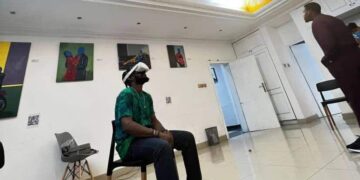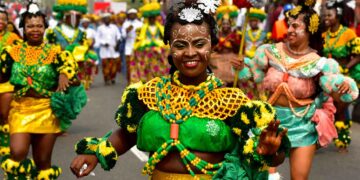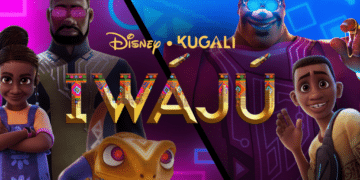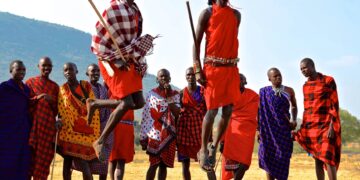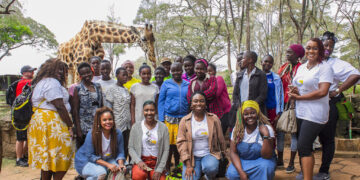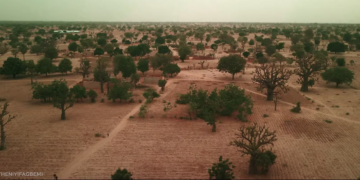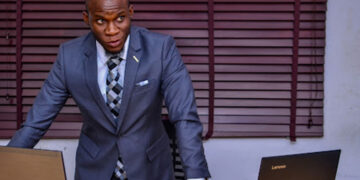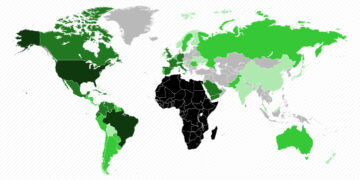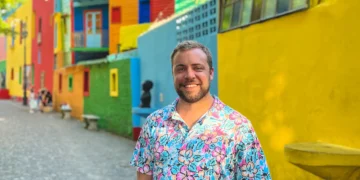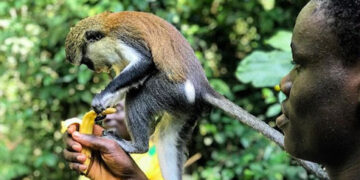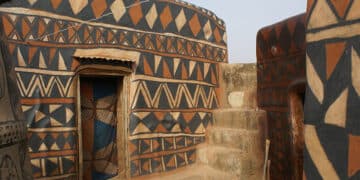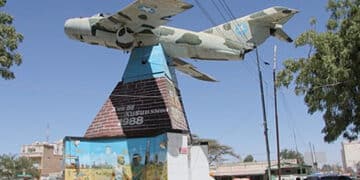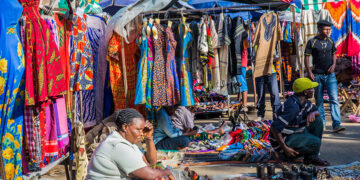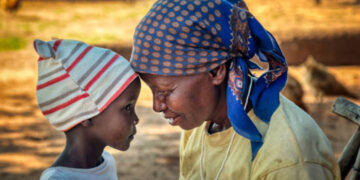Isabella Adediji is an Alaga on a mission. In this interview, she tells us how she has carved a niche for herself to provide a service that is rooted in Yoruba tradition, despite a less-than-average mastery of the Yoruba language.
The rich and colorful display of our culture and heritage are key features of any traditional wedding. In a Yoruba traditional wedding, another significant element is the presence of an Alaga, or what you could call a traditional master of ceremonies. She’s literally the spice of the wedding, and is central to ensuring the ceremony is enjoyable and that the rituals are performed according to tradition.

(Image courtesy Isabella Adediji)
If you are unversed in the Yoruba language, you will most likely drown in the flow of heavy dialogues, laced with Yoruba idioms, proverbs and what have you, which are characteristic of the ceremony.
But fear not. Enter Isabella Adediji aka Alaga Sisi Bella, aka Alaga Oloyinbo (the English-speaking Alaga) “Alaga to lo Cambridge,” which means, the Alaga who went to Cambridge (Isabella studied education, with English and drama at Cambridge) .

(Image courtesy Isabella Adediji)
Isabella is no ordinary Alaga, her love of adventure and thirst to test new waters, has led her to wear many hats as an editor, compere, presenter, educationist, writer, producer, voice-over artist and pr consultant.
Becoming An Alaga
Entering the world of Alagas was not right up her alley, but it was new, it was interesting, and she wanted to explore. The image and role of the Alaga had also moved past being a job usually carried out by aged women, who were well-versed in the Yoruba language and tradition.
Nowadays, most Alagas offer other services required in the ceremony, such as the Eru Iyawo, which involves procuring and wrapping the bride’s gifts, creating and designing the Proposal and Acceptance Letters, which are read out during the ceremony.
Her far-from-perfect Yoruba could easily have proved a no-entry barrier for her, but she saw it in a different light. “I felt it would be a good way to improve my Yoruba. My dad is Yoruba, while my mom is a mix of Igbo and German. Meanwhile, my paternal grandma spoke Yoruba to my cousins and everyone else while we were growing up, except me, because according to her, she didn’t want to spoil my ‘oyibo’ i.e my English.”
In 2021, when she went to have her baby in the U.S., she had hoped to be able to host a few events in the time she was there, but she observed that it was a field dominated mainly by men. Whereas, back home in Nigeria, the same didn’t hold true. She concluded it was pointless to hope for any gigs on that front.
That was when it occurred to her that Nigerians abroad who intermarried, would want to uphold their traditions, and thus, an Alaga would be required for their wedding. Such an Alaga would have to be educated and would also have to appeal to a non-Yoruba speaking audience. Viola! She had found her place.
A confirmation that she was on the right track came when she emceed a 90th birthday ceremony in Ilesha, Osun State in Southwestern Nigeria. “The crowd was mixed, but because it was Ilesha, there were people that would come up on stage and just speak Yoruba and I found it a bit off. While I understood we were in a Yoruba state, I felt they should have known not everyone who attended the party could speak or understand Yoruba. The most they could have done was mix it.”
Isabella sprang into action as an interpreter, since she could understand the language much better than she spoke it. That incident reminded her of her introduction ceremony, which, to a greater extent, was carried out in Yoruba, and had her maternal grandmother (who is German) and other non-Yoruba relatives in attendance. “I felt it was a missed opportunity to really share our culture and carry everyone along.”
Spurred by her Eureka moment, she went on Instagram and checked for Alaga training schools, and came upon the Alarede Engagement Academy, which was founded and run by Foluso Ogunjimi a.k.a Sokoyokoto— a marriage counselor, former broadcaster and graduate of Yoruba language from the Lagos State University (LASU).
She made enquiries and after receiving the class schedules, she figured she could make it work despite her other commitments. “I felt if I could attend about 70% of the class, then I was fine with that. I would be learning and asking questions as the need arose, improve my Yoruba, and learn some of the songs.”
Isabella started her classes in January, and immediately noticed that all the other students spoke Yoruba very fluently. “It didn’t make me feel anyhow. Because I felt if there were things I didn’t understand, I would ask my classmates and they would translate it.” Sometimes, when they had practical classes, she would wait till the end, so she could watch the others before taking her turn. Her performances caused the other students to laugh, but she didn’t let it bother her. “One of our teachers told some of my classmates to keep laughing at me. That I would get jobs. She said that I might not be doing well with my Yoruba, but that I was actually making improvements.”
It was a new learning experience for her. “The mode of education was like teaching drama and English together. Sometimes they will give you scripts with the sequence of an event or the lyrics to a song. Then other times, all you are doing is learning songs, or the teacher would demonstrate how to glorify God. We had a muslim student so they would teach both Christian and Muslim Yoruba songs, and there were times we would take notes, or get handouts.
“There were times we would stand up and demonstrate, dance, sing, act—pretend we were at an event. There could be a piece of paper that had the bride’s name or the family’s name and they would want you to greet the family to show what you have learnt.”
They would occasionally attend weddings to observe and enable them to have a real life experience.
Apart from juggling her other jobs, she was nursing her three-month-old baby. One time, she had to take her son to class because she didn’t have anyone to babysit. Her teachers and classmates admired her dedication.
Then, one day, during their onsite practicals (attending a real wedding), she found someone like her. “I noticed that the lady who was the Alaga for the groom’s family (Alaga Iduro) did not do as much work as the Alaga for the Bride’s family (Alaga Ijoko). She didn’t speak so much Yoruba also, because the family she was representing was Igbo. She would only speak Yoruba when she was talking to the other Alaga, but would converse in English to the family, explaining what needed to be done.”
Observing this, Isabella was confident that if the aspect of the Yoruba language was removed, she could deliver on the job remarkably. She also wanted to know about the Alaga who had represented the groom’s family, so she asked Mrs. Ogunjimi, who told her that the woman was based in the UK and was quite popular. She also shared a bit about the woman’s journey to Isabella, which left her impressed and encouraged.
Then exam day came. Even though she felt she may not have done as well as her classmates, she knew her confidence, ability to engage the crowd and work with her materials were areas she had mastered successfully.
The students’ families were invited to the graduation ceremony. They made different presentations, had to introduce themselves and sing at least one song from their husband’s side of the country. “After the first major assessment, Mrs. Ogunjimi told everybody that for the fact that all of us in the class were able to stand and face her, we had done well. Secondly, she told me the issues I had, like being in sync with the drummer or some of the singing especially in Yoruba. She told me to focus on speaking in English if that was what I was able to do, and speak the Yoruba I could. She gave me permission, albeit unknowingly, to be an Alaga the best way I could be. I didn’t have to do it 100% the way my classmates were doing theirs.”

With her teacher’s validation, Isabella, who also received the award for the Most Evolved Student, soon got a chance to prove her skills as an Alaga, thanks to her husband’s childhood friend with whom he had just reconnected.
When he found out Isabella was an Alaga, he immediately mentioned he was getting married. Although Isabella did not have any prior experience, she knew that she could always get help from her school. “Being the first Alaga job I had, I felt I didn’t have to be the one to do everything. That’s the point in being part of the school where you have classmates, seniors, juniors, and teachers.” She had also got opportunities to learn on the job by tagging along with other Alagas to events, where she acted in the capacity of a secretary and sometimes, even as an Alaga.
Isabella was to represent the bride’s family, which involved more work, though initially, she had felt that she would represent the groom, since he was the one who had made the connection. It was a mixed wedding, as the groom was Ibibio and the bride was Yoruba, although she was based in the UK. It was the sort of crowd that Isabella was happy to work with, because it didn’t require a purely Yoruba atmosphere.
The Business of Being An Alaga
The standard booking fee paid to an Alaga, need not be the only source of income, and Isabella sheds more light. “Traditionally, there should be an envelope given to the Alaga. They are catered for in terms of honorariums. A good Alaga can also make money as a band. During that process the Alaga is sprayed with money. There are also people who can call God with different names in various dialects, especially in Yoruba, and they really benefit from that. Sometimes, Alagas are expected to launch a letter at wedding ceremonies and people are expected to come out and support the launching with cash gifts.”
In the end, Isabella says it all boils down to one’s creativity, ability to read the room, and being able to deliver according to the client’s requirements. She also attributes her success to her prior experience as an emcee. “As an MC, what’s important to me is that I deliver first on what my client wants. If my client wants a classy keep to time thing, then that is my primary responsibility. I also make sure I engage those present at the event.”
Isabella believes she has found her place as the English-speaking Alaga. “There are people who will look for people like me especially if they are not Nigerians, or speak a different language. I am more like a cultural ambassador. I want someone who isn’t Yoruba to understand some of the significance of why we do what we do, and to appreciate the Yoruba culture and the ceremony.”
You can find Isabella Adediji on Instagram @isabellaadediji


